In our Open Thread for October 1, 2010, regular commenter Darin asked the following about The Social Network:
I haven’t seen The Social Network so maybe somebody can help me understand how a young rich asshole at Harvard(not my words about the character in the movie, many other peoples) who, as far as I can tell, screws his friends is so popular a movie.
To which I responded:
For the same reason a movie about a snobby war veteran who murders cops, cheats on his girlfriend and orders the execution of anyone who disagrees with him (The Godfather) is so popular. We love the rise-to-power narrative in America.
It was an offhand jape, the kind you make at a cocktail party or a business luncheon or the comments thread of the world’s smartest pop culture website (ahem). But did I hit on something there?
The Rise to Power Narrative
The rise to power narrative fits the following format:
1. Destitute young man (almost always a man) enters a world full of wealth and glamor that’s just beyond his reach.
2. A man with superior status establishes himself as a rival.
3. Our protagonist claws his way to the top, driven by ambition, cunning and maybe a few virtues.
4. He reaches a position of power sufficient to unseat his rival.
5. However, in the process, he has made enough enemies or entangled himself enough that he must now continue to climb.
6. He loses touch with the virtuous elements that got him to the top – the friends who helped him, the good behavior that made him a success.
7. Our protagonist’s story ends tragically – in his death, in his impoverishment, or in his cold reflection on the life he’s lost.
Laying the narrative out in that framework, we recognize it without much prompting. That’s Scarface. That’s The Public Enemy. That’s The Great Gatsby. That’s Citizen Kane. That’s The Godfather. That’s Wall Street.
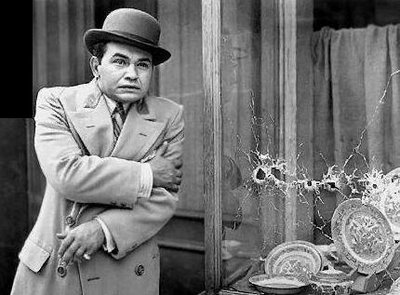
What an allegorical development dis is …
And, of course, it’s also The Social Network. Mark Zuckerberg isn’t driven to create an online social network because he wants to unite the world, or because he wants to make a billion dollars. He does it because he wants to prove how smart he is. The reasons for that come from a bunch of different places. He wants to impress his former girlfriend; he wants to show up the Winklevosses; he wants to prove that he’s worthy of (or better than) the Phoenix Club. In all of those cases, Zuckerberg is exposed to prizes beyond his reach and strives to attain them.
Zuckerberg claws his way to the top, driven by ambition, cunning, and maybe a few virtues. He’s a hard worker, coding the core of the website that will become Facebook in (apparently) less than two months. And he apparently has a genius insight into coding networks, though I don’t know enough about hacking to know whether this movie overcomes the problem of genius or not. But he’s also craven. He gets away with just as much as he can, then changes the subject, acts dismissive or apologizes when someone calls him on it. (An interesting parallel to the way Facebook’s privacy settings have eroded since its founding, but that’s for another day)
Zuckerberg transcends his rivals by Act Two of the film. In fact, given the film’s time-jumping structure, he’s whipped the Winklevosses by Act One. They discuss a website which no one has heard of; Zuckerberg invents a website that half a billion people use. The film interrupts the narrative with flash-forwards to the Winklevoss lawsuit, a tacit admission that Zuckerberg wins and they lose. In fact, given that this movie is (nominally) about real events, and more people use Facebook than the Harvard Connection by a factor of infinity, we walk into the theater knowing they lose. There’s no suspense. This would sink a lesser movie, but a rise to power narrative isn’t about the plot. We don’t care about the how in a rise to power story. It’s all about the will. Do our heroes have the will to drive them past obstacles?
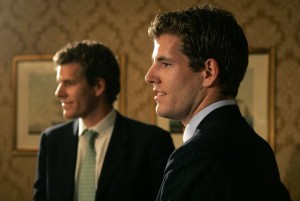
Pictured: actual Winklevoss twins.
If our hero triumphs over his rivals at the end of the movie, it’s not a rise to power narrative. It’s a typical hero’s journey. Ralph Macchio crane kicks Billy Zabka in the face. Burt Reynolds leads the convicts to victory over the prison guards. Keanu Reeves jumps down Hugo Weaving’s throat. Bam, pow, victory. Kiss the girl; roll credits. In a rise to power narrative, however, we keep going.
Zuckerberg trounces the Winklevosses once they get kicked out of Larry Summers’s office. They could have conceivably stopped Facebook at that point. When they fail, there’s no stopping Zuckerberg. They’ve lost; he’s won.
So what happens next? Our hero keeps climbing. Along the way, he starts losing friends. Zuckerberg fails at his one chance to win his ex-girlfriend Erica back as a friend. He begins alienating Eduardo, his CFO and his college buddy. He drops out of Harvard.
Zuckerberg moves out to California and immerses himself in a lifestyle that doesn’t seem to bring him pleasure. He’s not a huge drinker, he doesn’t sleep around and he doesn’t go to the same parties that Sean Parker goes to. You see in him the same dissatisfaction with wealth that plagues Tony Montoya in the latter half of Scarface, where he takes the least satisfying bubble bath ever, or with the titular Gatsby.
Where does it end? We know where it ends, because we’ve seen it intercut with the narrative from the very beginning. It ends with not just Zuckerberg’s enemies but also his friends suing him for a share of Facebook. It ends with the prestige he wanted – the admission to the final clubs that the Winklevosses symbolize – lost to him forever. It ends with Eduardo holding back tears as he stares at the ruins of their friendship. It ends with Marilyn Delpy (Rashida Jones), the young female lawyer who looked like she was trying to connect with Zuckerberg, calling him an asshole with whom no jury will sympathize. And it ends with Zuckerberg alone in a conference room, staring at the woman whose rejection started it all, hitting Refresh in the hopes that she’ll be his friend.
It’s not quite going out in a hail of gunfire. But that’s as tragic an end as verisimilitude will allow.
I’m Afraid of Americans
So The Social Network is clearly a rise to power narrative. It enters the same pantheon as The Godfather, The Great Gatsby, Scarface, Wall Street, All The King’s Men, Malcolm X and other classic stories. Man scrambles to the top, gets it all, and loses his soul in the process.
Notice anything about those works of art I listed? They’re all American.
I would argue that there’s something distinctly American about the rise to power narrative. American culture has always saved a special place for the self-made man: the scrapper who comes from nothing and ends up a hero. Americans mythologize our early Presidents and their log-cabin origins. America is the country that produced Horatio Alger, Ayn Rand’s novels and The Millionaire Next Door. It only makes sense that Americans produced the existential shadow that follows the sunlit rise.
European and Asian culture have lots of examples of art that look like a rise to power narrative. But upon deeper consideration, they don’t quite fit.
Take Macbeth, for instance. Scottish lord Macbeth conspires to take the throne of Scotland, only to be cast down by the story’s end. Just like Scarface, right? However, Macbeth’s sin isn’t ambition. It’s deviating from the natural order. That Elizabethan belief permeates all of Shakespeare’s plays – the belief in a metaphysics that reflect royal society. Hence the terrible weather that opens the play and the supernatural portents (Birnam Wood marching on a castle) that end it. You see similar things in Julius Caesar: the sky is filled with fire and apparitions the night before Caesar is to be assassinated. There is a natural order to the universe, a scala naturae or “great chain of being,” that ambitious subordinates overturn.
That’s not the same as the rise to power. The rise to power narrative is about the man. The scala naturae tragedy is about the social order.
Stars, hide your fires! Let no friend ‘Like’ my deep and black desires!
The Arthurian mythos seems like a classic example of a rise to power narrative. Arthur is crowned rightwise King of England, unites the lands from his throne at Camelot, then falls in battle and is carried off to Avalon. But there’s no singular Arthur story to examine. The Arthur narrative is a salad bowl of conflicting myths from all around England. It’s a Christ allegory, an invocation of Rome, a call to arms, a chivalrous romance and a lecture on infidelity. The Arthur mythos can be used to tell a rise to power narrative (as in John Boorman’s Excalibur). But that’s a rather recent interpretation. The flaw in Camelot is not usually Arthur’s.
The Chinese epic Romance of the Three Kingdoms could be loosely interpreted as a rise to power narrative, if looked at from the point of view of Cao Cao. But it’s clearly a much vaster story about the dissolution of the Han Dynasty and the rise of the Jin Dynasty. Cao Cao is a big name in the story, but only one player in a cast of thousands.
And a rise to power narrative should not be confused with a bildungsroman. The bildungsroman, or coming-of-age novel, is a rise to power narrative without the tragic end. Siddhartha leaves his family, meets the Buddha, gains great wealth, becomes a ferryman and learns wisdom. Huckleberry Finn runs away from home, discovers the hypocrisy of the South and resolves to defend the slave Jim. Andrea Sachs gets a job as a PA for a demanding fashion magazine editor, discovers that social standards of beauty aren’t all they’re cracked up to be, and emerges wiser. A coming-of-age novel is all about growth, and the growth is uniformly good.
The rise to power narrative is not exclusively American. Consider Kubrick’s film Barry Lyndon, for instance, or Vincent Cassel’s Mesrine films, or the Brazilian film City of God. But the narrative is predominantly American. Americans do it better than anyone else. And when the rest of the world does it, they imitate America.
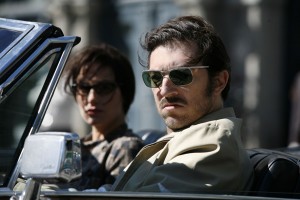
No, I’m not buying you a pigpen.
The Fault, Dear Winklevoss
The Social Network is a rise to power narrative. Mark Zuckerberg becomes the youngest billionaire on Earth but loses his soul in the process. It’s the same story as Citizen Kane. So what would the story have looked like in a different genre?
If The Social Network were a bildungsroman, the story would have started much earlier. We might see Zuckerberg on his first day at Harvard, fresh faced and eager to please. That eagerness would have been blunted by early encounters with upper class snobs, like the sinister Winklevoss twins. Zuckerberg loses something of his small-town innocence in his attempts to be like them. However, he’s not as good at playing the games of status as they are, so they refuse to accept him. Worse, he loses his other friends in the process, like steadfast Eduardo and sweet Erica.
Once Zuckerberg reaches his lowest point, though, a chance comment would inspire him. He’d realize that he didn’t need to distance himself from the “proles” at Harvard. In fact, all the connections he’d made were his greatest strength. If only he could harness the power of those connections in one giant, online network … and thus, Facebook is born. Cue the Winklevosses shaking their heads in disbelief. Cue Zuckerberg, carried to the gates of Harvard on the shoulders of a cheering crowd. Slow fade. Credits.
Or …
If The Social Network were an Elizabethan tragedy, Zuckerberg would have been much more ambitious in the beginning of the story. He would have spent a few scenes shaking his fist at the gates of the Phoenix Club, raging against them in iambic pentameter. And the creation of Facebook would have been much more underhanded. No insinuations about plagiarized ideas or rushing to market. Zuckerberg would have stolen the Harvard Connection’s code outright, cackling in triumph as the pageviews rolled in. The Winklevoss twins would have retreated to a rival school (Yale, perhaps) when the battle was lost.
But then! Erica Albright, the girl Zuckerberg slighted, would have taken up with the Winklevosses. She would have given them the one bit of information needed to overturn Zuckerberg – her cutesy nickname for him that functioned as the root user password for the Facebook servers, perhaps. Oh, if only Zuckerberg hadn’t betrayed her! Thus armed, the Winklevi would have stormed the walls of Harvard, cast Zuckerberg into the snow and restored the rightful order. Zuckerberg, freezing to death at the foot of the John Harvard statue, would croak out one last envoi bemoaning his plight. Curtains. Fin.
Neither of those sound quite as good, do they?
And don’t object that neither of those stories would be true. The Social Network is not the literal true story of the creation of Facebook. Sorkin and Fincher took several creative liberties in adapting it. But they could have adapted it in one of several different ways. They chose the rise to power narrative. Why?
Because, again, this is an American movie about American institutions, and the rise to power narrative is uniquely American. Americans love wealth, sport, competition and the self-made man. But they also love castigating pride and bringing the mighty low. America is a nation of Puritans financed by merchants. It has been since Jamestown rubbed shoulders with Plymouth. Americans both love and fear wealth. That’s why America has made the rise to power narrative so popular: to serve both urges at once.
One man climbing to the top fascinates Americans, and the world in turn. But, like Kanye says, no one man should have all that power.

Ehhrm, I think you forgot about one defining Rise to Power Story, the big daddy of of Rise to Power Stories: Richard III.
Unlike Macbeth or Julius Caesar there’s no natural order-aspect going on in the background, it’s simply Richards will to power that drives the story, partly fueled by his being a one-handed hunchback.
I think the dynamic might be somewhat simpler than you propose. The audience wants to know why the powerful are powerful; we project our beliefs and fears on people like Richard or Zuckerberg to help explain why they are mighty and rich and we are not. The focus on rugged individualism makes American culture very good at telling this kind of story, but I don’t think it’s uniquely American.
Unlike Macbeth or Julius Caesar there’s no natural order-aspect going on in the background, it’s simply Richards will to power that drives the story, partly fueled by his being a one-handed hunchback.
There’s a natural order aspect going on in every Shakespeare play, especially the ones about kings, and especially the ones about historical kings, and extra-especially the ones about British historical kings, and extra-super-especially the ones about British historical kings who can trace their descendancy to current sitting monarchs (Elizabeth of the House of Tudor, descended from Henry VII, who defeated Richard III at Bosworth).
Ok, wrong interpretation of ‘natural order’; I assumed you were talking about supernatural aspects. But the kind of natural order you mention permeates the rise2power stories aswell. There is a strong moral sense in the audience that greed isn’t good, crime doesn’t pay, friendship is more important than money, so Gekko going to jail, Tony Montana dying and Zuckerberg remaining alone can convincingly be read as restoring of the natural order. I really don’t see the enormous difference between that and Richard dying to end the War of the Roses.
nice use of “verisimilitude” there at the end!
Scarface : “Say hello to my little friend” : : Social Network : “Say hello to my 500 million friends”
I would totally watch the Shakesperean facebook movie–that actually kind of sounds awesome to me.
Fantastic column.
My one question – Has there ever been a woman’s rise to power movie? I can’t think of a single example. I can think of several that hit 6 of your 7 formats, but none that hit all 7. The difference between rise of power and bildungsroman seems to be step 7. Even movies with a female protagonist that follow the first six steps change 7 to ‘happily ever after’. The closest popular example that I can think of is “The Devil Wears Prada”.
Anne Hathaway:
1) Joins the fashionistas she doesn’t belong
2) Faces off against Emily Blunt for Meryl Streep’s affection
3) To the beat of a popular song, she impresses Streep
4) She now dresses well and is respected by her peers
5) But she doesn’t/can’t stay an assistant
6) and loses her boyfriend
this sets it all up. She could easily turn into the evil Karen Allen from Bill Murray’s ghost of future hell in Scrooged. But she realizes this and step 7
7) she turns back to who she was, gets her man back and still keeps the respect of Streep.
Now in my opinion – woman protagonists are protected by Hollywood from becoming a bad person while allowing their male counterparts to go through the ringer and come out a worse person. The audience will still like Charlie Sheen, Scarface, Zuckerberg, et al or, at the very least, begrudgingly respect them. Where if it was a woman who did this, men would think she was a royal B and woman would just hate here. Again, just my opinion but if anyone can illuminate this for me, I would appreciate it.
What about the two Cate Blanchett Elizabeth movies?
Haven’t seen them, but could be. I’ll have to watch them and get back to you.
The second one is probably a better example than the first one, though they both make a big deal about her having to choose between a personal life and being HRH Elizabeth.
Bob – I actually referenced The Devil Wears Prada in the article as an example of a bildungsroman. Since it ends on a high note, it’s not a rise-to-power narrative. Inherent in the RtP is a tragic end.
@John Perich – Very sorry, I didn’t even get the Andrea Sachs reference till you pointed it out. I guess it is because my inner dialog replaced Andrea Sachs with Anne Hathaway throughout the movie. Every time I watch Seven, it is Morgan Freeman and Fighty McFight Club chasing after American Beauty.
Also – I know the difference between RtP and bildungsroman is generally the final act. My question was mostly why don’t we allow women to fill the RtP narrative.
There does exist the very tried-and-true formula that began with VALLEY OF THE DOLLS (though it seems to be more popular in novels rather than film) whereby the narrative uses three women to tell it’s tale of superficial/power-hungry uprising. In using three heroines, it can leave the reader/veiwer with a choose-your-own-adventure type of ending in allowing each one to befall a separate fate; one tragic, one triumphant, and one landing on a sort of middle ground.
That model began earlier with All About Eve. Just saying.
If female rise to power films exist, they are traditionally about rising to power within a niche culture women are told they don’t belong in, often not because of their sex, but their talents or personality–whether that’s the world of ballet (Center Stage), law (Legally Blonde), or bartending/songwriting/whatever (Coyote Ugly). They are also predominantly fluffy comedies. Gone with the Wind and Funny Girl could also be seen as female rise to power stories, but the destruction that occurs in the end isn’t death, tragedy or loss of power, but the loss of a male partner. For a woman, that is supposed to be more devastating than a violent death–read into that what you will. The only other big example I can think of is Vanity Fair, which is a British story and which does end in tragedy (loss of male partner AND fortune AND child) for the heroine.
I thought of Mean Girls immediately. So far as I can tell, it fits all seven of the items on the list.
1. Cady’s parents raised her in Africa (the specific country is not mentioned). Now, she’s in an American suburban high school and has no idea how the social order works there. Change in economic status isn’t mentioned, but it’s implied; I think we can safely assume that most American audiences would think an unnamed African country qualifies as the third world. (Cady’s flashback sequences take place in the desert, with no structures in shot, making it seem like she didn’t even have a home or school in Africa.)
2. Cady gets a crush on a cute guy, then finds out that said guy is the boyfriend of Regina George — the school’s prettiest and most popular girl. Cady is persuaded by other friends to knock Regina off her perch, not just because of the cute guy, but because Regina has used her social power for evil in the past.
3. Cady “claws [her] way to the top, driven by ambition, cunning and maybe a few virtues.”
4. Cady “reaches a position of power sufficient to unseat [her] rival.”
5. “However, in the process, [she] has made enough enemies or entangled [herself] enough that [she] must now continue to climb.” Part of how Cady ensures her own power is by tricking Regina into gaining weight; once Regina figures this out, the two are locked in rivalry and Cady has to continue scheming to keep Regina down in order to stay on top. Cady’s personality suffers accordingly.
6. “[She] loses touch with the virtuous elements that got him to the top – the friends who helped him, the good behavior that made him a success.” Cady’s former “dorky” friends, and the cute boy (now Regina’s ex-boyfriend, due to Cady’s orchestration), abandon her because of her new, unkind personality.
7. “Our protagonist’s story ends tragically – in his death, in his impoverishment, or in his cold reflection on the life he’s lost.” In Cady’s case, it’s “social suicide” — she owns up for having been behind the Burn Book (even though she wasn’t the only one to write in it), and she joins the Mathletes (already dubbed “social suicide” earlier in the film). She goes to the prom in a polo and pants instead of a prom dress.
Stupidly, this all allows people to start liking her again. So I guess the end of the movie ruins it all. But, hey, almost?
@Perich: “Stars, hide your fires! Let no friend ‘Like’ my deep and black desires!” and like J. Hoffa said nice use of “verisimilitude”.
To all: Is the rise-to-power actually a cautionary tale? Does it resonate with us because the masses think they have to sell themselves out to be powerful or successful?
My friend is back from Ahghanistan and we’re going to the movies – a violent, shoot ’em up, super-action fluff popcorn-chomping movie. We will not be seeing assholes rise to power even if Perich has done a solid job of addressing the appeal.
isn’t it a natural order that “no one man should have all that power”? and that is the difference between the American stories and, let’s say, all the others: Americans think that one man can do it all and ignore the natural order. in America it’s all about EGO.
Lord of War also follow that narrative
hhmmm, so where does There Will Be Blood fit?
At first blush it would fit, but when you look at it closely,
1. Destitute young man (almost always a man) enters a world full of wealth and glamor that’s just beyond his reach. Check
2. A man with superior status establishes himself as a rival. Nope, he only hates himself
3. Our protagonist claws his way to the top, driven by ambition, cunning and maybe a few virtues. No vitures, but Check
4. He reaches a position of power sufficient to unseat his rival. Again, no rival.
5. However, in the process, he has made enough enemies or entangled himself enough that he must now continue to climb. Check
6. He loses touch with the virtuous elements that got him to the top – the friends who helped him, the good behavior that made him a success. Close to check but he never had good behavior, ‘My Left Foot’ was always a jerk.
7. Our protagonist’s story ends tragically – in his death, in his impoverishment, or in his cold reflection on the life he’s lost. Check
So going from this, the RtP is someone likeable who turns into a jerk and stays a jerk. Daniel was never likable throughout the movie, so during his rise to power he never lost his ‘humanity’. The tragity in these stories is that it is someone who can be likeable (Who didn’t cheer for Foster Kane when he smiled and said “Well, that means in 50 years I’ll be broke” or think good for you when Tony Montana finally got respect)turn into jerks.
Just my opinion, so I can be wrong.
oh, i agree. i’m just wondering about the structure of the movie. its not my favorite, but it is interesting structurewise. no? i mean, does it follow a structure or is it something new entirely? i dunno, hard to approach that movie. i hated it first time i saw it, but i think i just hated daniel.
Not sure about the structure just wanted to say about hating DDL – THANK YOU!!! I hated him eating the scenery the entire time. He over acted like an high schooler who’s theater mom told him his entire life he’s fantastic.
yeah, it was very farcical. i’ll watch it again, a bit more balanced this time and see. but the character just repelled me so much. then again, that was the point. but does th
The part about how Fincher determined to shoot Timberlake over Eisenberg’s shoulder was a particularly interesting observation.